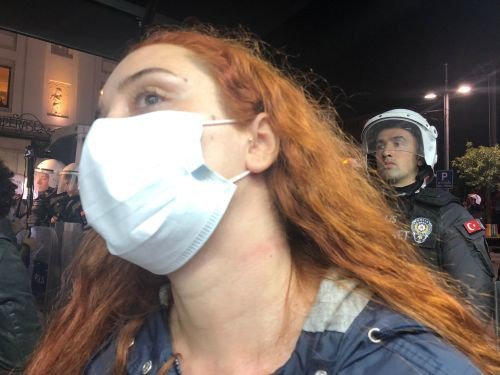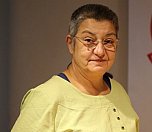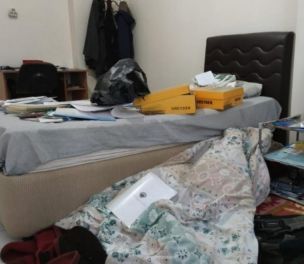Photos: Tuğçe Yılmaz/bianet
Click to read the article in Turkish / Kurdish
The police prevented two separate demonstrations yesterday (October 26) in İstanbul to protest the detention of 11 Kurdish journalists and Şebnem Korur-Fincancı, head of the Turkish Medical Association (TTB).
At around 7 p.m., the Women are Stronger Together (KBG) activists gathered outside of the Süreyya Opera House in the Asian-side district of Kadıköy.
Kadıköy'deki eylemlerden, gazetecilere baskı, açıklama yapanlara polis müdahalesi. Videolar2: @tucyil /bianet pic.twitter.com/vJ8tXGRevr
— Evrim Kepenek (@kepenekevrimm) October 26, 2022
The police surrounded the group and told them that the Kadıköy district governor had not permitted the demonstration. They did not allow the women to read out a statement against the detentions and detained at least 15 women and LGBTI+ activists.
They read out the statement in a side street later.
At 7.30, members of the Labor and Democracy Alliance gathered in the same place to protest the detention. The police attacked them as well, detaining at least 10 people.
Intervention against reporters
During the demonstrations, police officers also prevented journalists from following the events.
Officers pushed Eylem Nazlıer, a reporter for the daily Evrensel, out of the area while strangling her, and seized her phone for no reason.
 Eylem Nazlıer
Eylem Nazlıer
There were also journalists among the 25 detainees.
On October 25, eleven journalists working for two pro-Kurdish news outlets, Mezopotamya Agency and JINNEWS, were detained in raids across five cities in "terrorism-related" investigations.
Yesterday, Prof. Şebnem Korur-Fincancı was detained for "propagandizing for a terrorist organization" and "publicly degrading the Turkish Nation, the state of the Republic of Türkiye and its institutions."
The investigation against the professor concerns her comments for a media outlet about the allegations that Türkiye used chemical gases during its military operations against the Kurdistan Workers' Party (PKK) in Iraq.
Türkiye is a signatory of international conventions that ensure the freedom of assembly, and the Constitution guarantees the peaceful right to assemble.
Since 2016, restrictions on the right to assemble have become common, according to OHCHR (Office of the United Nations High Commissioner for Human Rights).
There needs to be authorization for meetings held in open air or open to the public. Spontaneous assemblies and undeclared assemblies are banned. Collective public statements, however, are permitted. In practice, both can be treated as unlawful depending on the evaluation of the (local) authorities. (TY/WM/VK)




.jpg)


